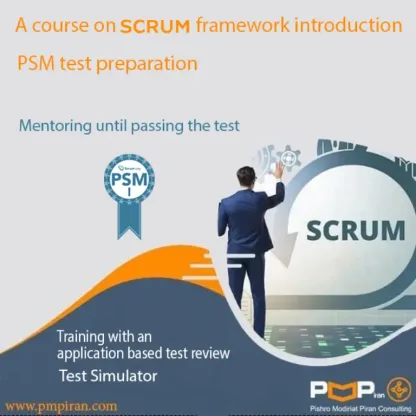
PSM I Exam Preparation Course
|
8 hours
Duration
|
10 participants
Course capacity
|
|
2 sessions
During the course
|
4 hours
Per week
|
The course’s importance
During the PSM I exam preparation course, you will learn the Scrum Framework’s basic concepts using the Scrum.org guide, the primary source for the various Scrum exams.
As you prepare for the PSM I exam, you will be familiar with a variety of questions, a web-based exam environment (PSM I exam simulator), how to enroll and pay for the exam, how to hold the exam, and all the issues involved in taking this international exam.
We want you to be aware that throughout the entire period of passing the PSM I exam, our instructors will be with you every step of the way to ensure you get the Professional Scrum Master I (PSM I) certification.
Additionally, using the experience of those who have achieved PSM I certification at this institution and under similar circumstances can help you to increase your chance of being accepted.
Course Benefits
- Holding semi-private classes
- Learn the necessary skills and knowledge to pass the PSM I exam
- Continual follow-up by instructors and comprehensive support to pass the PSM I test
- complete training in Scrum Guide
- Pre-participation assessments of PSM I tests using exam simulators.
Course summary
- Project managers and executives in agile organizations
- Software Developers
- Agile team members and team leaders
- Those interested in acquiring agile skills, techniques, and tools
- Those seeking to prepare and earn a background to take part in international courses and gain an international credential
The PSM I exam preparation course contents have been designed so that no prerequisites are necessary for participants.
PSM I Exam Preparation Course
RegistrationCertificate
Total number of participants
Number of courses held
Investing in courses
Exam preparation course for PSM I
| Course topics |
|---|
| Different models of project management |
| Agile project management |
| The difference between waterfall (traditional) and agile project management |
| Agile History |
| Agility Manifesto |
| The 12 Principles of Agility |
| Agile teams and their characteristics |
| Types of agile project management implementations |
| The Scrum Framework |
| Scrum Role Product owner Scrum Master Development Team |
| Scrum Artifacts Product Backlog Sprint Backlog Product Increment |
| Scrum Events Scrum Planning Scrum Review Scrum Retrospective Daily Scrum |
| Definition Of Done |
| Technical Debt |
Frequently Asked Questions
As software projects progress and the focus moves more towards agile approaches, the demand for project managers and IT professionals familiar with agile practices grows. People are encouraged to keep on updating their knowledge to promote their careers and find more suitable jobs.
This course can be a prerequisite to taking the Agile Certified Practitioner (ACP) course
The course can be attended by everyone who wants to gain knowledge and skills about agile project management or Scrum framework.
These courses are designed for people who want to learn about professional scrum frameworks and get professional certifications in agile project management.
There will undoubtedly be more job openings in agile project management, Software Development, and other related areas.
Scrum.org holds the Professional Scrum Master Level 1 (PSM I) exam, a 60-minute test with 80 multiple-choice questions.
There are no negative scores on exam questions.
Passing the PSM I exam requires candidates to answer 85% of the questions correctly.
Keeping in mind the difference in experience, English language levels, the diversity in project management between different industries, as well as our experience in running PMPiran for more than 15 years as well as positive feedback from graduates, we believe that each candidate will follow his own path to success and that group training cannot fulfill the efficiency of private and semi-private courses.
The course features:
- Training will consist of 8 hours of semi-private instruction with a thorough examination of the Scrum framework along with an exam preparation approach
- Access to an online exam simulator (PSM I) with more than 400 tests
- Mentorship until you pass PSM I
- during the course will present slides and videos for exam preparation
- Conducting registration procedures and other matters in PSM I
Through this course, you will not only gain knowledge of the Scrum Framework, but you will also gain better employment opportunities in managing various projects, particularly agile projects. As a result, Scrum masters who hold this credential are in great demand in numerous organizations.
Course Instructors

Saeed Moghaddasi
PSM I Exam Preparation Course
For more information about the course or to register, please contact us:
learn more!
Agile management is a repetitive approach in project management that supports the constant response to changes rather than following detailed and predetermined planning. In agile project management, responding to issues during the project is the most crucial benefit. Making project changes at the right time can save resources and ensure that a project will succeed.
In agile teams, feedback is provided quickly over a short period, and repetition is consistent and of the highest quality. Their repetitive releases and use of products are accelerated through the use of technology for continuous improvement.
Moreover, agile project management requires the team to monitor time and cost throughout the project continuously. The team measures their progress using burndown, burnup, and velocity charts rather than a Gantt chart or milestones.
Agile project management does not require the presence or participation of a project manager. Traditional project delivery methods, such as the cascade model (project managers determine and manage budget, scope, quality, and requirements before the project even begins), require the presence of the project manager to be successful. In agile project management, the project manager’s responsibilities are distributed among the team members.
An example is that product owners represent customers and set the project objectives, while team members share responsibilities and determine the planning, progress reporting, and quality of work. In some agile approaches, additional layers of management are added. With the Scrum approach, the scrum master aids the team in overcoming obstacles and guides them through the project.
Despite this, project managers are not old-fashioned in agile project management. Even today, organizations still often use project managers for their larger, more complex agile projects. However, companies place them in a more coordinated role with the product owner, who generally is in charge of the project’s overall implementation.
Due to the new role of project managers in agile teams, agile project management requires team members to learn how to work in this new way. They must be able to work together as well as with users. Communication is essential for making sure that projects move in the right direction.
A process framework known as Scrum has been utilized since the early 1990s to manage complex products. Scrum is neither a process, technique, nor method. Scrum is a framework that allows you to apply a variety of techniques and processes. Scrum clarifies the degree to which your product management and work practices are helpful, so you can continuously improve your product, team, and working environment.
The Scrum Framework consists of Scrum teams with roles, events, artifacts, and related rules. All of the components within this framework serve a specific purpose that is integral to Scrum’s success and smooth operation.
A Scrum law connects all of the roles, events, and artifacts in the process and governs their relationships and interactions.
The international organization scrum.org offers a Professional Scrum Master certification for those engaged in agile environments and implement Scrum at an organization as Scrum masters. This certification, defined in 3 levels, is the most widely recognized in this field.
Leave a Reply